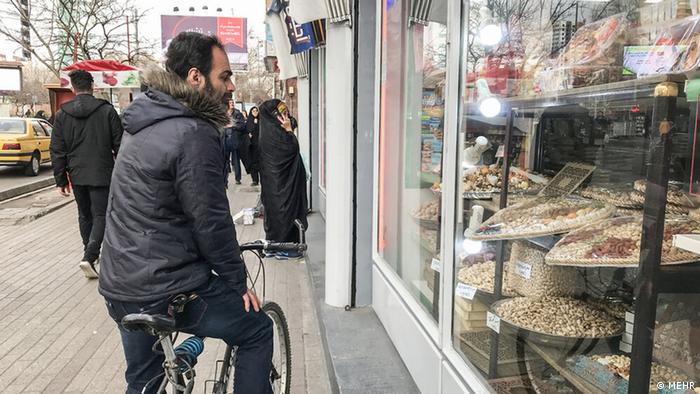Washington’s “maximum pressure” on Iran to feel, above all, ordinary citizens. Promising initiatives the income of many of the rich are strangled, barely to life.

“We have a network of about 200 women who make our products. They come from remote villages of the province of Balochistan,” says Maryam (Name changed) in an interview with DW. The 30-year-old business woman working for one of those Start-Up companies in Iran, which is trying to create especially for women in remote areas or from disadvantaged backgrounds jobs. Such initiatives are supported by the Iranian government, if not financially, at least morally.
In this case, it is traditional arts and crafts, the finest manual embroidery on garments made of silk or leather. The women who produce these pieces, present themselves as pupils of a master embroiderer named Mahtab, which had embroidered the dresses of the last Empress Farah Pahlavi. “At the moment it looks not good.

Embroidery from Balochistan was requested under the Shah and his wife Farah
Under the sanctions, the sewing material is much more expensive. At the same time our orders have decreased sharply. Our customers predominantly come from abroad, people who have travelled in the past few years in Iran and the us have met.” The reason for the missing orders: The financial sanctions imposed by the United States to make money Transfers difficult, if not impossible.
Losses in the tourism business
The recovery of tourism after the nuclear agreement have first created new jobs in Iran. “Baluchistan was fascinated by European tourists, despite the bad press,” States Maryam. But because of the US sanctions of the past year have set a number of European airlines, including Air France and British Airways, their flights to Tehran.
Balochistan is an arid, economically disadvantaged province in the Southeast of Iran bordering Pakistan and Afghanistan. Drug trafficking and smuggling are widespread. In some places the drug business is the only source of income. Women like Maryam have changed with clever business ideas this is a Situation for the Better. Now their businesses are suffering from the political tensions and economic sanctions.

Export enterprises could generate income in poor provinces such as Balochistan and would not the sanctions
“Economic war”
On Sunday (12.5.) Iran’s President Rouhani compared the effects of the – so literally – “economic war” by the United States against Iran in the eight year war between Iran and Iraq in the 1980s. This war started with an attack by the army of Saddam Hussein on Iran and hundreds of thousands of lives. The current “war” to throw but of greater problems, warned Rouhani to the Iranians: “at the Time, we had no problems with Oil exports and cooperation with international banks.” Negotiations with the United States, he granted a cancellation. Trump should take the exit from the nuclear agreements and the unilaterally imposed sanctions.
“All affected”
“My little daughter suffers from malnutrition. I don’t know how we could survive in this Situation, if we had no Relatives in the neighborhood.” Ali lives with his wife and two children in Mamazand, a suburb in the South of Tehran. He is a driver for a food company. “In the last twelve months, my salary has not increased, but has lost massive value. My salary was last year, the equivalent of 250 euros value, there are now just 100 Euro. The food prices are rising at the same time every day. Meat we can’t afford more,” says Ali of the DW.
Ali is the sole breadwinner. His wife wants to work, but she finds no point. Many women from the neighborhood worked as a cleaning women, reports Ali, especially in the affluent North of Tehran. Their meager wages would, however, cost a large part of the journey eaten.

Dwindling purchasing power in the Bazaar
“Life has become all the more difficult,” notes Sajadeh from the North of the city. Sajadehs husband is an engineer, she works as a nurse in a private hospital. “I’m glad that my family is healthy. The Situation in the case of medicinal products and medical devices is currently catastrophic,” says the 40-year-old mother of one child.
The import of raw materials for the pharmaceutical industry and of specialty medications was complicated by the financial sanctions. Special medicines are now imported from India or China. Their quality is not comparable with European products, says Sajadeh, and adds: “In hospitals there is a lack of medical devices and even to medical packaging. For example, the national blood Bank has warned hospitals to be careful with your reserves. It is not lack of blood. The people donate enough. But there are no blood bags.”